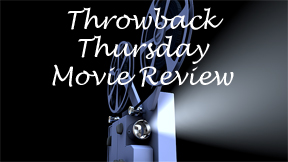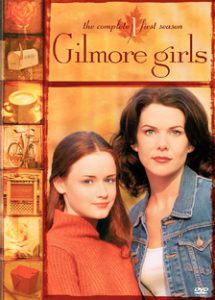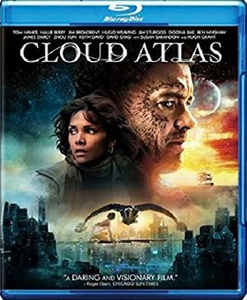On a kick of Wachowski movies, I notice their running theme of systems or rulers oppressing common or poor folk. That’s again the case in “Cloud Atlas” (2012). But it feels fresh because they – along with co-writer-director Tom Tykwer — come at the theme in an indirect, beautiful and epic way as they adapt David Mitchell’s 2004 novel.
Connections across time
“Cloud Atlas” makes the point that stories like this happen across all times and places. I already knew that, so it’s not the statement that’s notable, but rather the presentation and spirit. Remarkably, “Cloud Atlas” is generally upbeat and heartfelt. The beautiful score, composed in part by Tykwer, deserves a nod here.
I barely knew what was happening for the first hour of this nearly 3-hour film. But I was soaking up some of it, and I was totally hooked by the time the parallels among the six threads started to come fast and furious. To some degree, the structure automatically allows for this. All are good, but if there’s one you especially like, you don’t have to wait long for the film to cycle back to it.

“Cloud Atlas” (2012)
Directors: Tom Tykwer, Lana Wachowski, Lilly Wachowski
Writers: Tom Tykwer, Lana Wachowski, Lilly Wachowski (screenplay); David Mitchell (novel)
Stars: Tom Hanks, Halle Berry, Hugh Grant
We get a taste of Tom Hanks and a tribe of primitive people being harassed by cannibals, with Halle Berry as a well-meaning visitor from a land of floating ships and laser guns. In another future-set story, we follow Bae Doona as a fast-food waitress who learns about freedom and becomes a thorn in the totalitarian state’s side.
Sci-fi and historical fiction in same film
These two threads – the latter of which is set in “Blade Runner”-esque Neo Seoul – show the Wachowskis’ interest in vibrant futures after the muted palette of their most famous dystopian saga: the “Matrix” films. The films that bookend this one, “Speed Racer” and “Jupiter Ascending,” are likewise gorgeously colorful.
But “Cloud Atlas” is a true genre blend, as SF shares time with historic plots, including an unlikely friendship between a rich man (Jim Sturgess) and a stowaway slave (David Gyasi) on the 19th century high seas. The plight of a gay composer (Ben Winshaw) is probed in 1930s Scotland.
A conspiracy plot that’s both thin and hard to follow makes the 1970s San Francisco segment – featuring Berry as a reporter — the weakest. Jim Broadbent’s delightful turn as a man unwillingly stuffed into an old-folks home makes the contemporary London tale the funniest.
Collectivist, but not in the negative sense
“Cloud Atlas’ ” message is repeated many times: “Our lives are not our own. From womb to tomb, we are bound to others. Past and present. And by each crime and every kindness, we birth our future.”

Although collectivist on the surface, the message does not advocate governmental collectivism. Indeed, every story is about breaking free of the yoke of power, in ways big and small. The film’s hopeful mood comes from characters happily fighting for a better future even if it means their own death. They seem to know, on whatever spiritual level accounts for deja vu, that they have allies in different times and places.
Emphasizing this inter-connectedness, the main actors perform multiple roles. Appearing in all six threads are Sturgess, Berry, Hanks, Hugh Grant and “The Matrix’s” Hugo Weaving (of course playing villains, because he’s a master at it).
The end credits made me say “wow” as I learned some of these A-listers perform under layers of makeup to complete their sextet of roles. Sometimes, controversially, they play other races. But it’s done for deliberate and clear thematic reasons, so I think charges of racism are not warranted.
The building of worlds
Doona’s Sonmi, in the 22nd century yarn, gets my vote for best individual character. She undergoes the biggest change, and it’s always believable. Doona is sad-faced and understated, yet Sonmi leaves a lingering impression.
Hanks wins for “most versatile,” though. His standout role is Zachry, in the distant future. The world-building of this thread is worthy of its own movie. Language has become clipped – all extraneous syllables excised – like in Joss Whedon’s “Fray” comic book. Hanks smoothly speaks this language, and I found myself understanding Zachry more as the film went on.
Like all of the threads, it grew on me and I increasingly “got it” as the film went forward. I want to watch it again someday, although not as immediately as I desire a “Jupiter Ascending” rewatch. It’s not as fun as that movie.
Indeed, it borders on emotionally exhausting – albeit in the best way. “Cloud Atlas” is cerebral and artistic — a thoroughly impressive collaboration and adaptation.

